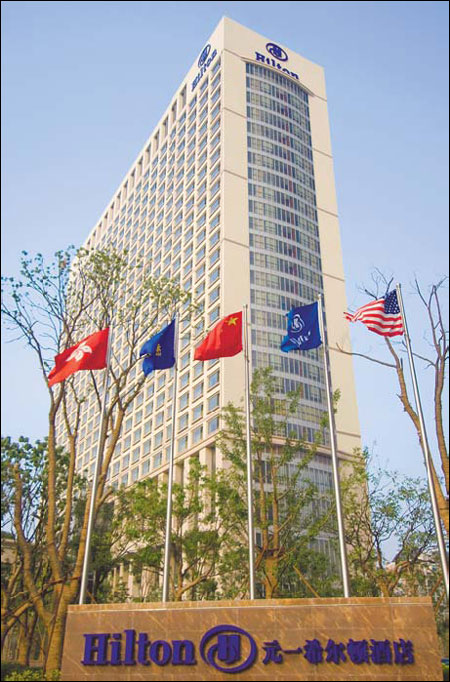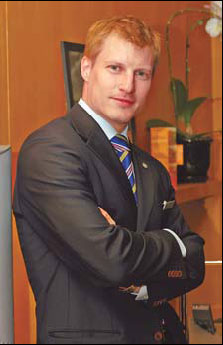Life and Leisure
Second to none
By Zhang Yue (China Daily)
Updated: 2010-10-05 08:46
 |
Large Medium Small |
|
|
When Markus Kosch enrolled in a five-year course on nautical engineering at the University of Barcelona in 1991, he was dreaming about navigating to the most glorious cities around the world.
Twenty years later, the 39-year-old German is guiding the world-renowned Hilton Hotel in China. After gaining experience in primary cities such as Beijing and Shanghai, he is now general manager of Hilton in Hefei, capital of Anhui province.
He took over as general manager of Hilton Hefei in the middle of 2008, nearly a year and a half after Hilton opened in the city. That was already his 11th year working for Hilton, following stints at Beijing, Shanghai as well as the Kowloon Panda Hotel in Hong Kong.
"The first year, 2007, was about positioning Hilton in the local market of the city," Kosch says. "Fortunately, we have managed to maintain our leading position in the province's hotel industry since we started our business here. Average occupancy rate in the first year was around 51 percent, which was good for a newly-opened Hilton."
However, while the hotel's occupancy rate increased to 68 percent in 2008 and keeps growing, Kosch finds dealing with people the biggest challenge in Hefei.
|
|
Over 95 percent of the staff are Chinese and their level of English is lower than that of employees in primary cities.
"Yet this does not create big problems for Hilton in Hefei, as I later noticed that 90 percent of our guests are also Chinese," Kosch says.
However, the high rate of staff turnover, he says, is the biggest challenge in managing the hotel's human resources in Hefei.
"When I started working here, I found that almost all the newly-recruited staff were greenhorns in the hotel industry, most of them fresh graduates," Kosch recalls. Initiating the staff into the rules of the industry, he says, "was something I've never experienced during my seven years' working in Shanghai."
The new recruits are made to man the reception, wait at the hotel entrance and do house-keeping as compulsory training before they are assigned a fixed position. However, some staff members drop out after a couple of weeks, not too happy with the post allotted to them after training.
"This happened when I worked for Hilton in other secondary cities as well," Kosch says, remarking how inconvenient it is to find a new set of people to train when trainees leave midway.
"Training people who are new to this industry takes much time and energy," he says, hastening to add that Hilton Hefei is "already doing considerably well, compared to the rest of the local market". The staff in Hefei, Kosch says, hardly ever leaves to join a competitor or new hotel and "we expect to finish this year with less than 40 percent turnover, which is the lowest for all the four- and five-star hotels in Hefei."
The hotel recently started collaborating with several colleges in Hefei. Students interested in working in hotels can apply for internships in Hilton in their fourth year at college. They would come to the hotel two or three times a week for a year for foundation training and to learn about real hotel life.
"This is a chance for the students to know whether it is a job they truly want," Kosch says.
The other difference running a hotel in a second-tier city, Kosch says, is that guests hardly ever make room reservations in advance.
"It is quite common for the front desk to receive guests asking for a room upon arrival," he says.
"Sometimes our rooms are full, and the guest is unable to get the standard room he got the last time. And they start complaining about the hotel's bad service," Kosch says, wishing people got into the habit of booking their "ideal room" in advance.
Again, sometimes a banquet for 500 people is requested only a day or two in advance, leaving the hotel with little preparation time. Having dealt with several such troublesome situations, the hotel is trying to find ways to inspire local people to plan ahead.
"We would explain to every client we meet at the reception and on the phone about the importance of making reservations," Kosch says.
He feels people in Hefei have comparatively limited opportunities to learn about Western culture and food, as the city has only a limited number of visitors from overseas. Therefore the hotel organizes themed activities every month, such as international food festivals and dinner with drinks, at which guests could try food and wine from various countries.
"Many guests said it was their first wine dinner and did not know what to wear," Kosch says. "It is also a very good chance to help them know about Western culture and etiquette."
Despite difficulties and challenges, Hilton Hefei has a lead in the local hotel market. The city will have a few more international hotels opening next year, which might challenge Hilton's occupancy rate and market share, something they have hardly worried about so far.
"Yet we do see challenge and competition as a good thing," Kosch says. "That's the way we learn to improve and it is also very beneficial for the city and existing hotels."

